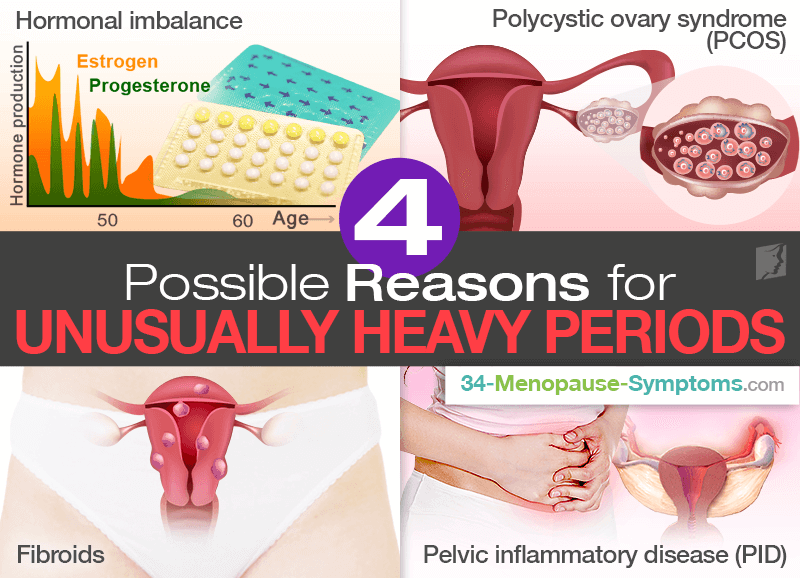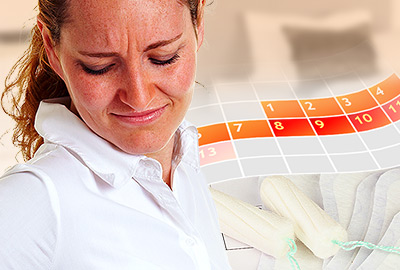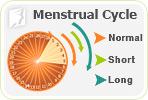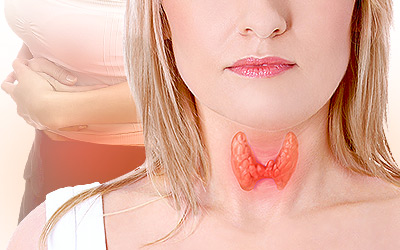Women tend to be familiar with their individual usual monthly cycle, awareness of which is necessary in order to be able to recognize any significant changes. While heavy periods might be the norm for some of us, for others they can be alarming if they occur unexpectedly. It can be helpful to prepare yourself somewhat should this occur, by enhancing your knowledge about why they can happen.
Hormonal Imbalance
Sometimes, it is possible to experience a heavy bleed if there is an imbalance of the reproductive hormones, estrogen and progesterone. This can happen throughout the menopause, but also might happen as a consequence of certain contraceptives. These are the most common reasons for this condition, but there can be others such as dysfunction of the ovaries, and it accounts for around half of cases. This happens when your ovaries do not release an egg, because there is no production of progesterone.
Polycystic Ovary Syndrome (PCOS)
This is a considerably common disorder, which is often hereditary. It can also be caused by an excessive amount of insulin in the body, which can be present in those who are resistant to the effects of insulin (i, e; the body will naturally produce more in this case), and in overweight women. When this happens, there is not only a problem with the ovary, it also causes an increase of the production of testosterone - which can lead to irregular periods that are heavier when they occur.
Fibroids
This is a relatively unknown condition, which actually affects around a third of all women - most of whom are aged between 30 and 50. Fibroids are small growths which develop in or around the womb, and are non-cancerous. They remain unfamiliar because most of the time they do not present any side effects; however; 1 in 3 sufferers might experience lower back pain, constipation, or unusually heavy periods.
Pelvic Inflammatory Disease (PID)
PID is most common in women aged between 15 and 24, but it can occur in any woman. The term describes a bacterial infection which is contracted in the vagina but spreads north. The infection can be contracted because of the natural bacteria that is present in the vagina, but about a quarter of cases happen as a consequence of a sexually transmitted disease. PID can cause excessive bleeding during periods, as well as general pain and unusual discharge.
Usually heavy periods do not have a worrisome cause, and they only occur sporadically. If you are experiencing them on a more regular basis, or are worried about the amount of blood you are expelling, it is advisable to discuss your condition with a doctor in order to gain professional advice. Learn more about irregular heavy periods.
Sources
- Mayo Clinic. (2014). Menorrhagia. Retrieved June 16, 2017, from http://www.mayoclinic.org/diseases-conditions/menorrhagia/basics/causes/con-20021959
- National Health Service UK. (2015). Fibroids. Retrieved June 16, 2017, from http://www.nhs.uk/Conditions/Fibroids/Pages/Introduction.aspx
- National Health Service UK. (2016). Heavy periods. Retrieved June 16, 2017, from http://www.nhs.uk/conditions/Periods-heavy/Pages/Introduction.aspx
- National Health Service UK. (2015). Pelvis inflammatory disease. Retrieved June 16, 2017, from http://www.nhs.uk/conditions/pelvic-inflammatory-disease/Pages/Introduction.aspx
- National Health Service UK. (2016). Polycystic ovary syndrome. Retrieved June 16, 2017, from http://www.nhs.uk/conditions/Polycystic-ovarian-syndrome/Pages/Introduction.aspx
- Patient. Heavy Periods. (n.d.). Menorrhagia. Retrieved June 16, 2017, from https://patient.info/health/heavy-periods-menorrhagia




